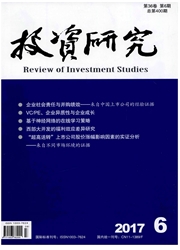

 中文摘要:
中文摘要:
针对我国资本市场频频发生的政府补助现象,本文利用ST公司数据就政府补助的影响因素与经济后果进行了考察。研究发现,相比民营企业,国有企业在经营陷入困境时,更易获得政府补助;对于级别越低的政府,由于干预企业及保牌的动机强烈,更有可能对经营困难的国有企业进行补助;在市场化进程较低的地区,因政府干预经济的程度较高,政府补助困难国企的现象更为明显;最后,政府补助仅短期内提高企业经营业绩,就长期而言,对企业绩效的促进作用并不明显,而且,政府补助对民营企业业绩的改善要优于国有企业。
 英文摘要:
英文摘要:
Government subsidy is quite common in China's capital market. Using ST listed company data, we investigate how ownership and marketization influence government subsidy and further analyze the effect of subsidy on firm performance. We find that a struggling SOE is easier to obtain government subsidy than a private company. We further find that the lower the level of government, the more possible it is to subsidize local SOEs in trouble, since it has higher incentive to intervene firm operation and prevent SOEs being delisted. We also observe more government subsidies to SOEs in less marketized regions be- cause the economies in these areas are highly intervened by local government. Finally, government subsidy can help improve firm performance only in short term and have little effect for the long period. Particularly, government subsidy results in better performance to private companies than to SOEs.
 同期刊论文项目
同期刊论文项目
 同项目期刊论文
同项目期刊论文
 期刊信息
期刊信息
